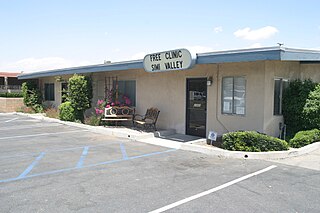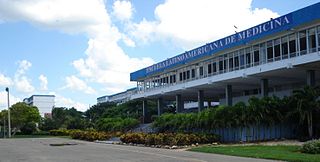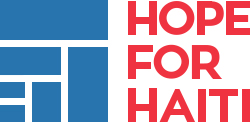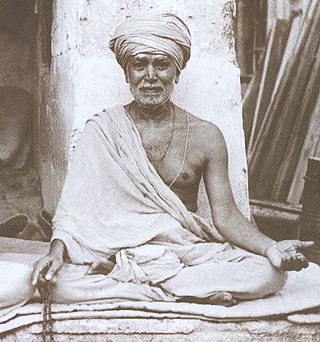
The United States Public Health Service Commissioned Corps is the uniformed service branch of the United States Public Health Service and one of the eight uniformed services of the United States. The commissioned corps' primary mission is the protection, promotion, and advancement of health and safety of the general public.

A free clinic or walk in clinic is a health care facility in the United States offering services to economically disadvantaged individuals for free or at a nominal cost. The need for such a clinic arises in societies where there is no universal healthcare, and therefore a social safety net has arisen in its place. Core staff members may hold full-time paid positions, however, most of the staff a patient will encounter are volunteers drawn from the local medical community.

Latin American School of Medicine (LASM) formerly Latin American School of Medical Sciences, is an international public medical school operated by the Cuban government established in 1999 and supported by the Venezuelan Government (RBDEV). Its mission is to "contribute to the training of Primary Health Care physicians in diverse regions of the World" according to Almaty objectives.
Haiti—an island country 600 miles off the coast of the U.S. state of Florida—shares the Caribbean island of Hispaniola with the Dominican Republic. Haiti has received billions in foreign assistance, yet persists as one of the poorest countries and has the lowest human development index in the Americas. There have been more than 15 natural disasters since 2001 including tropical storms, flooding, earthquakes and hurricanes. The international donor community classifies Haiti as a fragile state. Haiti is also considered a post-conflict state—one emerging from a recent coup d'état and civil war.

Project HOPE is an international global health and humanitarian aid non-governmental organization founded in the United States in 1958. Project HOPE works in five main areas: disasters and health crises; infectious diseases; noncommunicable diseases; maternal, neonatal and child health; and health policy. The organization has been led by President and CEO Rabih Torbay since 2019.
A health professional, healthcare professional, or healthcare worker is a provider of health care treatment and advice based on formal training and experience. The field includes those who work as a nurse, physician, physician assistant, registered dietitian, veterinarian, veterinary technician, optometrist, pharmacist, pharmacy technician, medical assistant, physical therapist, occupational therapist, dentist, midwife, psychologist, audiologist, or healthcare scientist, or who perform services in allied health professions. Experts in public health and community health are also health professionals.

The healthcare delivery system of Pakistan is complex because it includes healthcare subsystems by federal governments and provincial governments competing with formal and informal private sector healthcare systems. Healthcare is delivered mainly through vertically managed disease-specific mechanisms. The different institutions that are responsible for this include: provincial and district health departments, parastatal organizations, social security institutions, non-governmental organizations (NGOs) and private sector. The country's health sector is also marked by urban-rural disparities in healthcare delivery and an imbalance in the health workforce, with insufficient health managers, nurses, paramedics and skilled birth attendants in the peripheral areas. Pakistan's gross national income per capita in 2021 was $4,990 and the total expenditure on health per capita in 2021 was Rs 657.2 Billion, constituting 1.4% of the country's GDP. The health care delivery system in Pakistan consists of public and private sectors. Under the constitution, health is primarily responsibility of the provincial government, except in the federally administered areas. Health care delivery has traditionally been jointly administered by the federal and provincial governments with districts mainly responsible for implementation. Service delivery is being organized through preventive, promotive, curative and rehabilitative services. The curative and rehabilitative services are being provided mainly at the secondary and tertiary care facilities. Preventive and promotive services, on the other hand, are mainly provided through various national programs; and community health workers’ interfacing with the communities through primary healthcare facilities and outreach activities. The state provides healthcare through a three-tiered healthcare delivery system and a range of public health interventions. Some government/ semi government organizations like the armed forces, Sui Gas, WAPDA, Railways, Fauji Foundation, Employees Social Security Institution and NUST provide health service to their employees and their dependants through their own system, however, these collectively cover about 10% of the population. The private health sector constitutes a diverse group of doctors, nurses, pharmacists, traditional healers, drug vendors, as well as laboratory technicians, shopkeepers and unqualified practitioners.

Direct Relief is a nonprofit humanitarian organization whose mission is to improve the lives of people in poverty or emergency situations by providing the appropriate medical resources. The charity provides emergency medical assistance and disaster relief in the United States and internationally. The organization is headed by an independent board of directors and its president and CEO, Thomas Tighe.

Humanity First is an international charity that provides disaster relief and long term development assistance to vulnerable communities in 52 countries across 6 continents. The organisation is run by volunteers with diverse skillsets across the world and has access to thousands of extra volunteers worldwide. Volunteer staff in all areas often pay their own expenses to support the international projects.
Americares is a global non-profit organization focused on health and development that responds to individuals affected by poverty, disaster, or crisis. The organization addresses poverty, disasters, or crises with medicine, medical supplies and health programs.

British United Provident Association Limited, trading as Bupa, is a British multinational health insurance and healthcare company with over 43 million customers worldwide.
IsraAID is an Israel-based non-governmental organization that responds to emergencies all over the world with targeted humanitarian help. This includes disaster relief, from search and rescue to rebuilding communities and schools, to providing aid packages, medical assistance, and post-psychotrauma care. IsraAID has also been involved in emergency response and international development projects in more than 60 countries, with focuses on Water, Sanitation & Hygiene, public health and medical care, education, and mental health and protection.

Hope for Haiti is a non-profit organization based in Naples, Florida, USA, founded in 1989 by JoAnne Kuehner. The mission of the organization is to improve the quality of life for the Haitian people, particularly children, through education, healthcare, water, infrastructure and economy. In addition, Hope for Haiti has an emergency relief component and has responded to several natural disasters like the 2010 Haiti earthquake and Hurricane Matthew since its founding.

A healthcare center, health center, or community health center is one of a network of clinics staffed by a group of general practitioners and nurses providing healthcare services to people in a certain area. Typical services covered are family practice and dental care, but some clinics have expanded greatly and can include internal medicine, pediatric, women’s care, family planning, pharmacy, optometry, laboratory testing, and more. In countries with universal healthcare, most people use the healthcare centers. In countries without universal healthcare, the clients include the uninsured, underinsured, low-income or those living in areas where little access to primary health care is available. In the Central and East Europe, bigger health centers are commonly called policlinics.

David Vanderpool is an American medical doctor and the CEO and founder of LiveBeyond, an international humanitarian development organization which has provided medical, spiritual and logistical support to disaster-ridden countries.

BAPS Charities is an international, religious, charitable organization that originates from the Bochasanwasi Akshar Purushottam Swaminarayan Sanstha (BAPS) with a focus on serving society. This focus on service to society is stated in the organization's vision, that "every individual deserves the right to a peaceful, dignified, and healthy way of life. And by improving the quality of life of the individual, we are bettering families, communities, our world, and our future." BAPS Charities carries out this vision through a range of programs addressing health, education, the environment, and natural disaster recovery. The organization's worldwide activities are funded through donations and are led by a community of over 55,000 volunteers who are mostly members of BAPS. The volunteers work with local communities and other charities and the organization's activities are mainly based out of their mandirs.

Alison Thompson is a global humanitarian volunteer and the Founder of Third Wave Volunteers, a United States based nonprofit that responds to disasters and crises around the world. She was born in Sutherland Shire, Sydney, Australia.

Benjamin Danielson is a pediatrician and clinical Professor of Pediatrics at the University of Washington School of Medicine. Throughout his time as a pediatrician, Danielson has facilitated the creation and development of diversity programs and contributed actively to governmental policy as a member of several health boards. Danielson was the medical director of the Odessa Brown Children's Clinic from 1999 to 2020, where he then resigned and spoke out about prevalent institutional racism and a resistance to change from hospital leaders. In September 2021, it was announced that Danielson would be directing a new program, Allies in Healthier Systems for Health & Abundance in Youth (AHSHAY) to help address and prevent youth incarceration.
Medical volunteerism, also medical volunteering, is volunteering in the context of providing medical treatment. It is one form of both international and domestic volunteering. International medical volunteering may include a range of resource-based solutions associated with the set up of a mobile clinic, volunteer assistance in local hospitals or clinics, or at home healthcare services.
Paul Caulford is a Canadian advocate, academic, and family doctor in Scarborough, Toronto who provides free healthcare to refugees, undocumented migrants and other newcomers who are unable to get healthcare through the formal channels.














